九年级英语时态课件
英语人教版九年级全册时态讲解
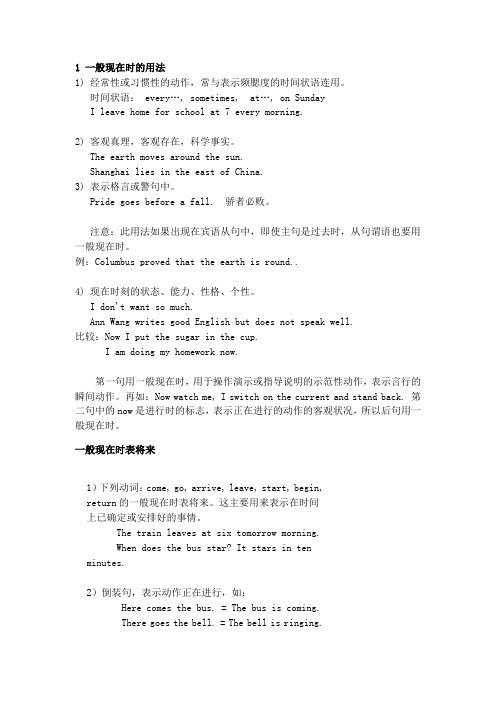
1 一般现在时的用法1) 经常性或习惯性的动作,常与表示频腮度的时间状语连用。
时间状语:every…, sometimes,at…, on SundayI leave home for school at 7 every morning.2) 客观真理,客观存在,科学事实。
The earth moves around the sun.Shanghai lies in the east of China.3) 表示格言或警句中。
Pride goes before a fall. 骄者必败。
注意:此用法如果出现在宾语从句中,即使主句是过去时,从句谓语也要用一般现在时。
例:Columbus proved that the earth is round..4) 现在时刻的状态、能力、性格、个性。
I don't want so much.Ann Wang writes good English but does not speak well.比较:Now I put the sugar in the cup.I am doing my homework now.第一句用一般现在时,用于操作演示或指导说明的示范性动作,表示言行的瞬间动作。
再如:Now watch me, I switch on the current and stand back. 第二句中的now是进行时的标志,表示正在进行的动作的客观状况,所以后句用一般现在时。
一般现在时表将来1)下列动词:come, go, arrive, leave, start, begin,return的一般现在时表将来。
这主要用来表示在时间上已确定或安排好的事情。
The train leaves at six tomorrow morning.When does the bus star? It stars in tenminutes.2)倒装句,表示动作正在进行,如:Here comes the bus. = The bus is coming.There goes the bell. = The bell is ringing.3)在时间或条件句中。
仁爱版英语九年级上册知识讲义-一般过去时、现在进行时、现在完成时-
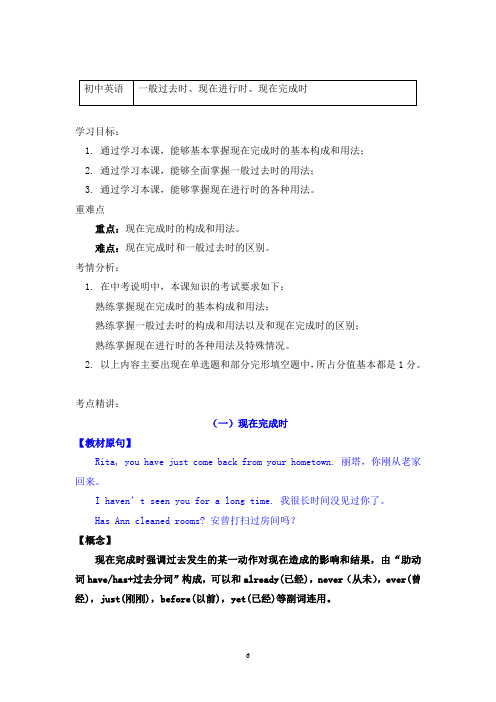
学习目标:1. 通过学习本课,能够基本掌握现在完成时的基本构成和用法;2. 通过学习本课,能够全面掌握一般过去时的用法;3. 通过学习本课,能够掌握现在进行时的各种用法。
重难点重点:现在完成时的构成和用法。
难点:现在完成时和一般过去时的区别。
考情分析:1. 在中考说明中,本课知识的考试要求如下:熟练掌握现在完成时的基本构成和用法;熟练掌握一般过去时的构成和用法以及和现在完成时的区别;熟练掌握现在进行时的各种用法及特殊情况。
2. 以上内容主要出现在单选题和部分完形填空题中,所占分值基本都是1分。
考点精讲:(一)现在完成时【教材原句】Rita, you have just come back from your hometown. 丽塔,你刚从老家回来。
I haven’t seen you for a long time. 我很长时间没见过你了。
Has Ann cleaned rooms? 安曾打扫过房间吗?【概念】现在完成时强调过去发生的某一动作对现在造成的影响和结果,由“助动词have/has+过去分词”构成,可以和already(已经),never(从未),ever(曾经),just(刚刚),before(以前),yet(已经)等副词连用。
1. 现在完成时强调过去发生的某一动作对现在造成的影响和结果。
—Have you found him yet ? 你已经找到他了吗?—No, he has probably gone home. 不,他大概已经回家了。
(现在不在这里)2. 现在完成时也可表示开始于过去并持续到现在的动作或状态,可以和表示从过去某一时刻延续到现在(包括“现在”在内)的一段时间的状语连用。
表示持续动作或状态的动词多是延续性动词。
I haven’t seen her these days. 我这些天没有看见过他。
He has taught us since I came to this school. 自从我来到这所学校,他一直教我们。
人教版九年级上学期英语课件: Unit2(共35张PPT)
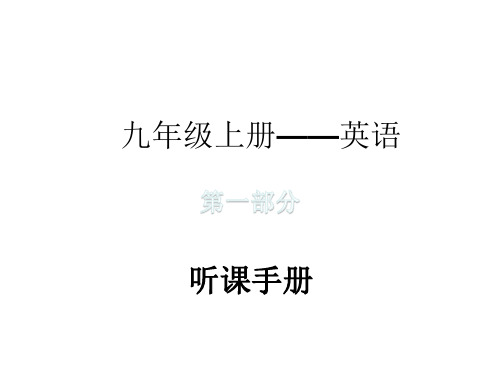
九年级上册Unit 2
例题跟踪演练 (B ) 4. (2017内蒙古呼和浩特) There are fifty students in Class One. Twenty of them are boys, __________ are girls. A. the other B. the others C. others D. anther 解析:本题考查代词。根据句意可知twenty boys是fifty students里面的一部分,而横线处 表示特定的另一部分且横线处作为are的主语。
九年级上册Unit 2
A rooster lying on the ground lied that he laid an egg yesterday. 一个躺在地上的公鸡撒谎说他昨天下了一颗 蛋。 He lay on the floor, reading a book. 他躺在地板上看书。 The small town lies among the mountains. 小镇位于群 山之中。 I’m sorry I lied to you. 我很抱歉向你撒了谎。 He laid the book on the table. 他把书放在了桌子上。
九年级上册Unit 2
例题跟踪演练 ( A ) 3. When she came back a few days later, she found that all things still ______ where she had ______ them. y; laid id; laid y; lain D.lying; lain 解析:本题考查辨析易混词。根据句意可知第一个横线 处动词的主语是all things, 所以动词表达的是位于;第 二个横线处动词的主语是she,所以动词表达的是放置。 且整个句子是用的是过去时态。
外研版九年级英语上册语法复习课件 Module7

单项选择
( A ) 1. ----Why not buy a radio and learn English on the radio?
----______________
A. Sounds like a good idea!
B. It doesn't matter.
C. Thanks for your help.
-----Wonderful. We were all_________with the __________trip.
A. pleased;pleasant
B. pleasant;pleased
C. pleasing;pleased
D. pleasant;pleasing
( B ) 5. Now people's __________life is becoming better and better.
have/has +been done
主动语态和被动语态的比较
时态 主动语态
被动语态
过去将来 时
过去完成 时 情态动词
Was/were + going to do
Would + do
had+ done
can/must...+do
Was/were + going to be done Would +be +done had+ been +done
❖ 2.Linda’s parents make her practice the piano every Sunday. Linda is made to practice the piano every Sunday.
九年级英语一般过去时态

一般过去时态练习
把下列句子改成相应时态
1. He usually gets up early in the morning. But he got up late today. 2. She usually works from 8 a.m. to 5 p.m. But yesterday she worked from 8 a.m. to 6 p.m. 3. They often go to the park on Sundays. They went to the park last Monday. 4. He reads the newspaper at breakfast. But yesterday he didn’t read the newspaper.
返回上页 返回首页
一般过去时态句式的构成
陈述句式
动词 be 肯定式 否 定 式 I was …. I was not(wasn’t)…. He /She/it was…. He/She/It was not(wasn’t)…. We/You/They were …. We/You/They were not (weren’t)… I/You/He/She/It/We/You/They did not(didn’t) work. There was not (wasn’t) …. There were not (weren’t)….
疑问句式和简略答语 第二人称 第三人称
Were you…? Was he/she/it…? Yes,I was. Yes,he/she/it was. No,I was not. No,he/she/it was not. Were you…? Were they…? Yes,we were. Yes,they were. No,we were not. No,they were not. Did you work? Did he/she/it work? Yes,I did. Yes,he/she/it did. No, I did not. No,he/she/it did not. Did you work? Did they work? Yes,we did. Yes,they did. No,we did not. No,they did not. Were there any…? Yes,there were. No,there were not.
期中综合复习(课件)-九年级英语上册(外研版)
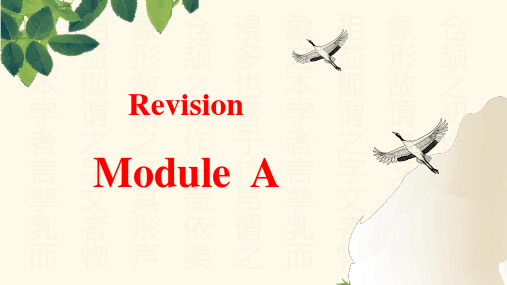
四、原因状语从句
★原因状语从句通常由because, since, as引导。如: He didn’t come to school because he was ill. As it is raining, we shall not gnswer the question, I’ll ask someone else.
表完成,just, already常出现。 表持续,for常接时间段。 表经验,ever, never句中间。
六、过去进行时 1、概念:表示过去某一时刻或某一时间段内正在进行的动作。 2、构成形式:was/were +动词的现在分词(v. -ing)。 3、时间状语:at that time, at this time yesterday, at six yesterday, when+从句 (动词为过去式)等。
五、结果状语从句
★结果状语从句由so…that, such…that, so that引导。如: He is so poor that he can’t buy a bike for his son. She is such a good teacher that everybody likes her. My pencil fell under the desk, so that I couldn’t see it.
★ because表示直接原因,语气最强。Because引导的原因状语从句多 放在主句之后。回答由why提出的问题,只能用because。As和since语 气较弱,一般用来表示明显的原因。由as和since引导的原因状语从居 多放在句首。如:
---- Why aren’t going there? ---- Because I don’t want to. As he has no car, he can’t get there easily. Since we have no money, we can’t buy it. ★ because和so不能同用在一个句子里。
2022-2023学年仁爱版九年级英语(上学期)Unit4知识点汇总课件
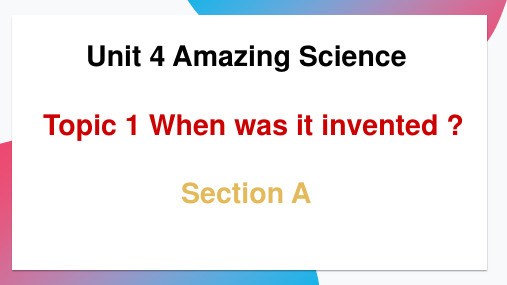
A .Camera B. Lift C. MP3 player
( B)5 .We should spend more time ___because it’s too
important.
A .to learn English B. learning English C. in English
3. A Journey to West _is__sh_o_w_n__ (show) on CCTV
every summer. 4.On Christmas Day, children wake up early
and can’t wait _t_o_o_p_e_n (open) the boxes of presents. 5. We’ll have a chance _t_o_s_e_e (see) the flower show this weekend.
(C )2.We all know that paper ___wood.
A. is made of B. is made into C. is made from
( C )3.This kind of machine ___in 2006.
A. is invented B. is made C. was invented
1.My mother allows me to use her cellphone.(改为被动语 态) I _a_m___ a_l_lo_w__e_d __t_o__ use my mother’s cellphone.
2.A rocket is used for launching satellites and spaceships. (就画线部分提问)
人教版九年级上册英语课件:Unit 1 Section B(2a-2e) (共14张PPT)

• A.on business B.by the way
• C.on your own
D.on the top
• 点拨 句意:对你来说,夜晚独自一人去森林里散步是很危险的。on business出差;by the way顺便;on your own独自一人;on the top在顶部。分析句意可知选C。
• 三、根据中文意思完成句子,一空一词。
• 1.【天津中考】电视开着,但是玛丽没注意看。
• The TV was on,but Mary wasnp'aty_in_g_______a_tt_e_nti_o_n_____________ to it.
• 2.【陕西中考】没有知识,你成功的可能性就会小一些。
这个短语中的to是介词,其后若跟动词,动词应用动名词形式。 • 8.depend on取决于;依靠;依赖。它通常不用于进行时态和被动
语态。
• 9.even if即使,纵然。它引导让步状语从句,可与even though换 用。
• 10.unless conj.除非,如果不。它用于引导条件状语从句,多数情
• 一、根据句意及首字母或中文提示写出单词。
• 1.I see a chance toc_re_a_t_e________(创造) somethiห้องสมุดไป่ตู้g new.
• 2.【2018·江苏宿迁中考】Natural resources are very important
for us and wewsisheloyuld use them ____________(明智地).
• 2.ability n.能力;才能。短语:the ability to do sth做某事的能
力。其形容词为able(能够)。 • 3.create v.创造;创建。其形容词为creative(有创造力的)。
- 1、下载文档前请自行甄别文档内容的完整性,平台不提供额外的编辑、内容补充、找答案等附加服务。
- 2、"仅部分预览"的文档,不可在线预览部分如存在完整性等问题,可反馈申请退款(可完整预览的文档不适用该条件!)。
- 3、如文档侵犯您的权益,请联系客服反馈,我们会尽快为您处理(人工客服工作时间:9:00-18:30)。
8. Jim with his parents _____ abroad. They ____ back
in two weeks.
A. have gone;will come B. has gone;will come C.
have been to;have come D. has been;come
过去状态
I was in Grade Eight last year.
过去连续 She put on the coat and 活动 went out.
一般将来时
will +动原 be going to +do
一般将来时用法 将来状态 There will be rain tomorrow. 将来活动 What are you going to do next
9. —I have finished my homework.
—When ___ you ___ it ?
A. have; finished B. do; finish C. did; finish D. will;
finish
10. I _____ my mobile phone for five years .
一直进行 He is writing a novel this year.
与 always
连用
My teacher is always smiling in class.
现在完成时
have\has+过去分词
现在完成时用法
I can’t find my pen. I have lost
过影响现 it.
A. bought B. have bought C. had bought D. have had
11. ---Susan, why are you still here? They are all
ready to start.
---I’m sorry, but I _____when to meet.
Have you finished it yet ?
He has worked here for a year.
过延到现 I have been in this school
since 1999 .
He has been to China twice.
两“去” He isn’t here. He has gone to
the library.
一共复习了 5个了,还 有1个呀!
过去进行时
was\were+ doing
过去进行时用法
过时正进 I was doing my homework
at eight last night.
过段直进
They were watching TV from nine to ten yesterday.
客观事实 The moon moves round the
earth.
主将从现
We’ll go there if it doesn’t rain. He’ll call you when he arrives.
一般过去时
was\were did
一般过去时用法
过去活动 I saw him yesterday.
A. don’t tell B. didn’t tell C. haven’t told D. wasn’t told
12. Jim is a student and
in Town High School.
A. studies B. studied C.ndy
his old friend Tom when he was
when, They were reading aloud while when the teacher came in.
《练兵场》
1. The shop ___ at 7:30 p.m. on weekends. A. will close B. closes C. closed D. has closed 2. If he ___ early tomorrow, he’ll be late. A. doesn’t get up B. won’t get up C. gets up D. doesn’t
around the sun. A. moves B. moved C. is moving D. to move 6. He used to ___ a lot. A.smoking B. smoke C. smoked D. smokes 7. Lucy ___ silly questions. A. is always asking B. always ask C. will always ask
gets up 3. Listen! Xiao Li ___ an English song. A. is singing B. sings C. is going to sing D. sang 4. The harder you ___, the better results you will get. A. will study B. studied C. study D. studying 5. The teacher told us in class that the earth ___
crossing the street.
weekend?
主将从现 I will call you as soon as I get
there tomorrow morning.
现进表将 The bus is coming.
现在进行时
is\am\are+doing
现在进行时用法
正在进行 Look, they are playing football.
态
一般现在时
六 一般过去时 种 一般将来时 时 现在进行时 态 现在完成时
过去进行时
一般现在时
is \ am \ are do \ does
一般现在时用法
习惯活动 I get up at six every morning.
现在情况
They are very busy. He needs help.
